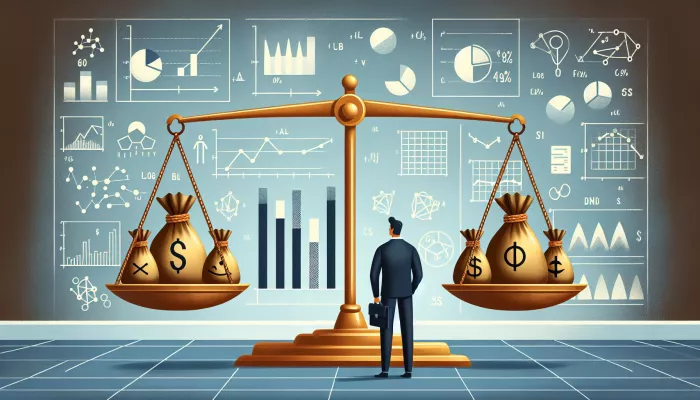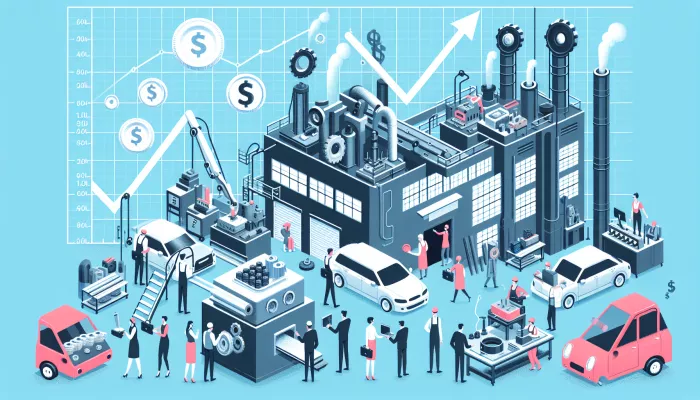

Manufacturing, a word we often hear, is essential to the world we live in. But, do you know what exactly is its role in the economy?
Manufacturing is not just about producing goods and commodities; it is a crucial pillar that supports economic growth and innovation in many nations.
In essence, manufacturing is the process of converting raw materials into finished products, either by manual or mechanical means. This can include a wide range of products.
The important thing to highlight is that manufacturing is a development engine that drives several industries.
Manufacturing plays a vital role in a country's economy in several ways. First, it is a significant source of employment.
In many countries, especially developing ones, manufacturing provides employment for a large segment of the population, thus contributing to poverty reduction and improving the quality of life.
Furthermore, it boosts the economic growth.
Manufacturing activity stimulates growth through innovation and efficiency, leading to better quality products at more affordable prices for consumers.
This not only improves living standards, but also stimulates demand and consumption, cycles that are vital to the economic health of any country.
Manufacturing is also a fertile scenario for innovation. Many of the greatest technological innovations have emerged within the manufacturing sector.
This is important because innovation leads to the development of new technologies and products, which can open up new markets and business opportunities.
however, the direct consequence is a boost to a country's international competitiveness.
Another crucial aspect of manufacturing is its contribution to international trade. Manufactured goods represent a large share of exports from many countries.
This not only generates significant revenue, but also strengthens international trade relations and elevates a nation's economic status on the world stage.
In short, manufacturing is much more than just the production of goods; it is a vital component of the global economic structure.
Its role in promoting employment, stimulating economic growth, innovation and international trade demonstrates the importance of investing in and supporting this sector.
As we move into a more technologically advanced future, manufacturing will continue to be an essential cornerstone of sustainable economic development.
Financial education It's not just about learning how to manage your money, but also understand how different economic sectors affect our daily and financial lives.
A manufacturing, being a critical pillar of the global economy, has a significant impact that can be best understood through the lens of financial education.
First, by understanding the fundamentals of manufacturing, we gain insights into the product pricing process.
Manufacturing, with its production costs, raw materials, labor, and technology used, directly influences the final cost to the consumer.
This knowledge allows for more conscious consumer choices, valuing products of best added value instead of just price.
Financial education also shows us how manufacturing is vital to economic stability of a country.
Strong manufacturing sectors can mean more jobs and, consequently, a more stable economy.
With this understanding, we can appreciate policies and investments that foster manufacturing growth as a means of strengthening the economy.
Ultimately, financial education empowers individuals to make more informed investment decisions.
Understanding the health and trends of the industry can be crucial in deciding which companies or equity funds to invest in.
Financially educated investors tend to look for companies with solid, innovative and sustainable manufacturing operations that are aligned with consumer and technology trends.
In short, the financial education is a powerful tool to understand not only personal finance management but also the impact of key sectors such as manufacturing on the global economy.
It prepares us to make more informed choices as consumers, voters and investors, contributing to a more resilient and economically conscious society.
To deepen your knowledge about financial education, sites like Investopedia It is NerdWallet offer a wealth of information accessible to everyone.
The relationship between manufacturing, economics and financial education is intricate and vital for the sustainable development of societies.
Understanding this connection helps us make more informed decisions, both personally and collectively.
A manufacturing is the backbone of many countries' economies. It not only creates jobs, but also drives innovation and economic growth.
Manufactured goods constitute a large part of international trade, influencing the trade balance between nations.
By understanding the role of manufacturing in the economy, we can better appreciate its importance in our daily lives.
Financial education, on the other hand, equips individuals with the knowledge needed to make wise financial decisions.
This includes understanding how the larger economy impacts personal finances, recognizing the importance of investment and effective resource management.
A financially literate population is better prepared to face economic uncertainties and actively contribute to the economy.
Manufacturing success directly affects economic prosperity and employment levels.
The greater the manufacturing output, the more robust the economy. This leads to greater purchasing power and the expansion of markets, creating a virtuous cycle of growth and innovation.
In turn, this reinforces the importance of financial education, ensuring that both consumers and businesses make pragmatic choices for long-term economic sustainability.
A solid understanding of financial education allows us to interpret how fluctuations in manufacturing and the economy affect our lives.
This ranges from retirement planning to choosing investments and understanding economic cycles.
By integrating financial education with economic knowledge, we develop a population capable of making informed decisions, thus promoting a more resilient and prosperous society.
Relevant sources and tools:
With this understanding, we can chart a more informed and sustainable path for the future.
To deepen your knowledge about financial education, sites like Investopedia It is NerdWallet offer a wealth of information accessible to everyone.
Delve into the interconnection between manufacturing, economy It is financial education is essential to understand the global economic panorama and the role of each individual in this context.
In short, the financial education is a powerful tool to understand not only personal finance management but also the impact of key sectors such as manufacturing on the global economy.
It prepares us to make more informed choices as consumers, voters and investors, contributing to a more resilient and economically conscious society.